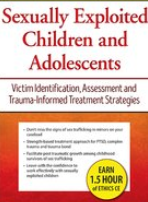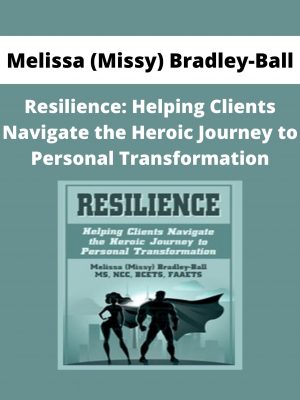Katheen Leilani Ja Sook Bergquist – Sexually Exploited Children and Adolescents
$200 Original price was: $200.$75Current price is: $75.
Shopping Instructions:
- DISCOUNT 15% : SHOP15
- Product Delivery: Within 1 – 12 hours after purchase.
Working with these children can be complex, they often don’t see themselves as victims, and unprepared but well-intended clinicians can replace the trafficker from the youth’s perspective.
Katheen Leilani Ja Sook Bergquist – Sexually Exploited Children and Adolescents
Are there kids on your caseload that your gut tells you something is not right? Often that is the first clue clinicians have that a child is being trafficked. Parents miss it, educators miss it, and unfortunately too many therapists miss the telltale signs. This workshop will immerse you in the experiences of commercially sexually exploited youth and provide you with competencies to work effectively from a trauma-informed perspective.
In this recording, learn from Kathleen Leilani Ja Sook Bergquist, JD, PhD, LCSW, as she draws on more than 20 years of working with survivors of sexual assault. Dr. Bergquist will show you effective clinical strategies to:
- Identify trafficked children and adolescents
- Work with youth that are often justice-involved and/or in foster care
- Break the trauma bond that allows the trafficker to control the child
- Identify trauma-specific evidence-based approaches, there is no one approach fits all!
Working with these children can be complex, they often don’t see themselves as victims, and unprepared but well-intended clinicians can replace the trafficker from the youth’s perspective. As a clinician, there is nothing more rewarding than helping youth free themselves from the trauma bond of those who exploit them.
- Identify the signs that a child has been trafficked and determine a proper treatment plan.
- Create the appropriate therapeutic environment to enable the best clinical outcomes for a trafficking survivor.
- Summarize federal laws specific to human trafficking and identify how this information could impact clinical treatment.
- Utilize a strength-based treatment approach for clinical issues such as PTSD, complex trauma and trauma bond.
- Determine how to facilitate post traumatic growth among childhood survivors of sex trafficking.
- Explore the role of the clinician in supporting clients’ rights to self-determination, safety and well-being.
Would you like to receive Katheen Leilani Ja Sook Bergquist – Sexually Exploited Children and Adolescents ?
Sex Trafficking of Youth
- Legal and clinical definitions
- Federal and state laws
- Domestic Minor Sex Trafficking (DMST)
- Commercially Sexually Exploited Children (CSEC)
- Sexually Exploited Youth (SEY)
- Risk factors for sex trafficking
- Adverse Childhood Experiences (ACEs)
- Average age of entry
- Lack of psychosocial development
- Specific vulnerabilities
- Limited support in environment
Assessment and Red Flags
- Tools or screening for identifying victims of DMST
- Cluster of behaviors and/or social contexts that are indicators of trafficking
Trauma Bond: “Superglue of Sexual Exploitation” and Moral Injury
- Psychological underpinnings of entry to trafficking
- Understanding traffickers/pimps
- Psychological processes of grooming victims
- Why victims stay, why they return
Treating the Trauma of Trafficking
- Evidence-based treatment for traumatic stress (e.g. TF-CBT, EMDR)
- Strengths-based treatment approaches (e.g. CBT, resiliency, client as expert)
- Trauma-informed care v. trauma-specific services
- Treatment matching for different types of trafficking
Post-Traumatic Growth: Transformation from Victim to Survivor
- Discover strengths by working through the trauma (Tedeschi & Calhoun)
- Resiliency v. post-traumatic growth
- Critical questions; perceived v. actual growth
- Case examples: From trauma to recovery
Potential Treatment Obstacles and What to do About Them
- Lack of trust in providers and law enforcement
- The power of trauma bond
- Risk of returning to trafficking
- Instability of care
Legal and Ethical Considerations
- Contradictions between client-centered practice and legal/law enforcement needs (i.e. detention v. safe house)
- Laws that impact trafficking victims
- Safe harbor laws
- Age of consent for minors
- Prosecution of trafficking cases
- Role of the clinician in supporting clients’ rights to self-determination, safety and well-being
Related products
HEALTH & MEDICAL
HEALTH & MEDICAL
HEALTH & MEDICAL
KettleWorX – 8 Week Rapid Evolution Advanced Set with Alex Isaly
HEALTH & MEDICAL
HEALTH & MEDICAL
HEALTH & MEDICAL
HEALTH & MEDICAL












